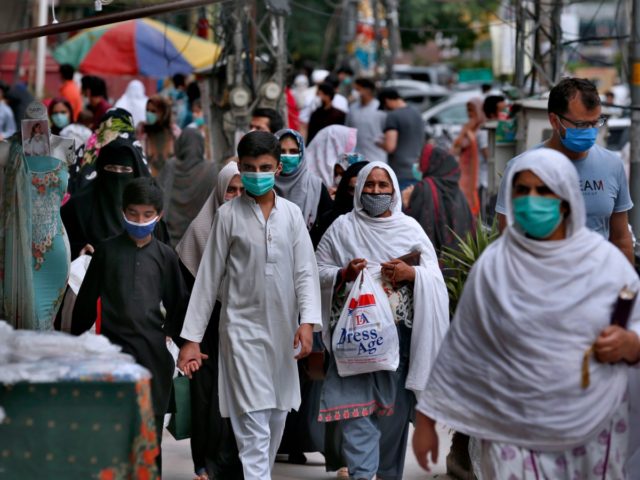Pakistan’s Supreme Court ordered the government to lift remaining coronavirus lockdown restrictions on Monday so businesses could fully reopen.
The top court, whose decision is binding, argued Pakistan was “swallowing so much money” with a shuttered economy and claimed it was no longer worth staying locked down when there “apparently is not a pandemic in Pakistan,” Reuters reports.
Government authorities cited economic strain as the main reason for reopening larger businesses, such as shopping malls, this week. The decision comes amid a surge in Chinese coronavirus cases across the country, despite the court’s declaration that there was “not a pandemic in Pakistan.”
The court ordered shopping malls to reopen at the discretion of national health authorities. The decision also calls for restrictions on businesses “opening on the weekends” to be lifted, a mandate which coincides with the end of Ramadan, a month-long Islamic holiday, this weekend. Traditionally, the end of dawn-to-dusk fasting and prayer, known as Eid al-Fitr, sees crowds flooding shopping malls to gather and shop in celebration.
Pakistan’s railway announced it will resume train services at limited capacity starting May 20. The announcement, which came on the same day as the court order to reopen malls, seems to have been made to accommodate increased travel during the holiday weekend, which is also typical. According to the report, both the “transport and retail shopping” sectors in Pakistan expect to draw “massive crowds” this holiday weekend.
Last week, Pakistan announced an easing of lockdown restrictions, allowing some retail markets to reopen. Upon last week’s partial reopening, shopping markets were “packed” with customers, most of whom ignored physical distancing and face mask mandates still in place to curb coronavirus transmission, according to the report.
The court cited the reopening of small retail markets last week as part of its reasoning for opening larger shopping malls this week, arguing that if markets were open there was no longer any “justifiable rational or reasonable” basis for keeping malls shut.
“We find no reason why so much money is being spent on this [Chinese] coronavirus, for that, Pakistan is not the country which is seriously affected by it,” the court order said, according to the report.
On Tuesday, mosques across Pakistan reopened for “five-time [a day] congregational prayers” in an unofficial move orchestrated by Pakistan’s top Imams, or Islamic religious authorities, who wield an excessive amount of power in Pakistan.
“We hope for cooperation from the government. The government should also announce lifting the ban on congregational prayers,” Mufti Usmani, the representative for Pakistan’s Islamic clerics, said in a statement released Tuesday.
Previously, Pakistan’s prime minister, Imran Khan, had allowed the Imams to pressure him into easing some restrictions on gatherings at mosques while the country was still under stricter lockdown.
At press time, Pakistan had reported 43,966 infections and 939 deaths from the Chinese coronavirus, although the number of cases and deaths is believed to be much higher. Pakistani health authorities cite the nation’s deficient testing practices, due to a lack of medical supplies and a reluctance on the part of the government, as the main reasons for the underreported coronavirus cases.

COMMENTS
Please let us know if you're having issues with commenting.